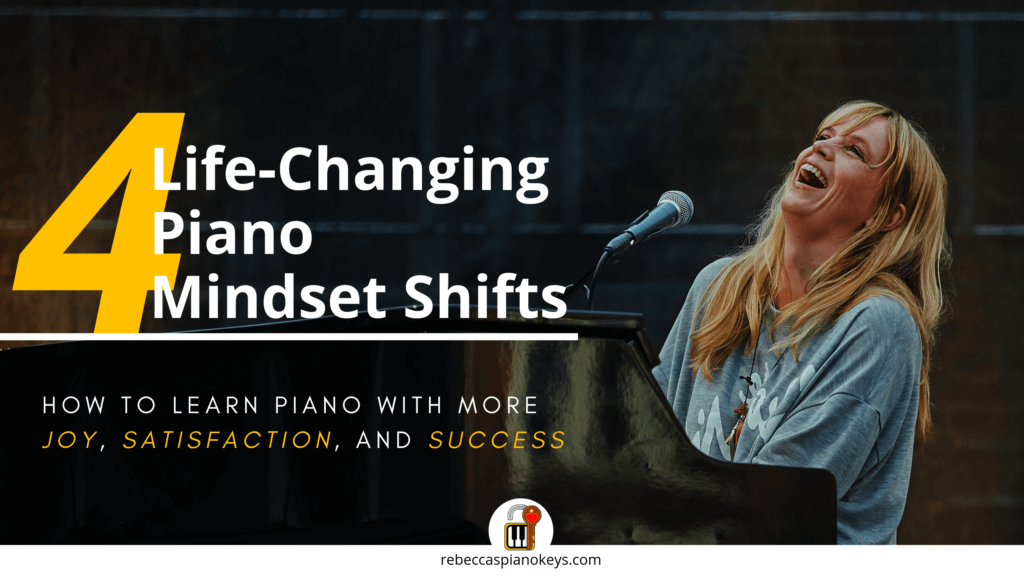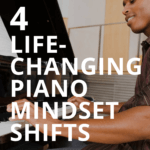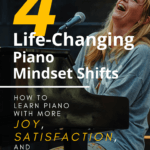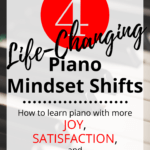Last Updated on January 24, 2022 by Rebecca
Piano should never feel like a chore! It's hard work, but you should enjoy all the word. If something just doesn't feel right, these 4 life-changing piano mindset shifts might be just what you need to infuse more joy, satisfaction, and success into your piano learning!
If you're not feeling joy, satisfaction, and success when you think about your piano learning journey, it's time for a piano mindset shift!
There are a lot of strong opinions floating around about what learning piano should look like. We all have that image of the young child who starts private lessons at age 6, has a beautiful grand piano at home, practices 3 times a day, masters advanced classical music before graduating high school, and ends up in Carnegie Hall.
But this image can put a lot of pressure on all the “ordinary” people out there who just want to play.
It can be easy to get sucked into a feelings of negativity when it comes to learning piano. To start feeling like you're doing it wrong, or you don't have what it takes, or it's too much work, or you can't afford it, or you don't have the time, etc.
These negative thoughts can leave you feeling discouraged about learning piano.
So it's time to turn those thoughts around, once and for all!
The following 4 life-changing mindset shifts will change your attitude about piano for the better, so that your piano learning journey brings you more joy, more satisfaction, and more success!

Piano Mindset Shift #1: Learning Piano Should Be Fun
Look, I'm not going to lie to you and say learning piano doesn't involve a serious investment of time, effort, and hard work.
Because it does.
But if you're not enjoying yourself, then what's the point?
Piano is a labour of love. Meaning it's hard work, but you should love putting in the work. You should enjoy it. It should be fun for you!
Sure, you'll have some days when you're frustrated or just not into it. But overall, learning piano should be making you feel better, not worse!
The great thing about piano is that there are so many different styles of music, different levels of difficulty, and different approaches to learning. So if you're not having fun with your piano journey, you probably just haven't found the right style, difficulty, and/or approach for you.
And this is really good news, because it's an easy fix!
Just figure out which of the 3 areas is giving you grief (the style, difficulty-level, or approach), then try something different in that area. It may take a bit of trial and error to find your sweet spot, but you'll get there. And when you do… [cue the Hallelujah chorus]! 😉
Piano Mindset Shift #2: You Should Want to Achieve Daily Piano Practice
First, let's address what this does not mean:
- It does not mean you must practice every day. It's better if you do, but you can still get results if you don't!
- It does not mean you must intend to practice every day. Again, daily practice will get you better and faster results, but there's nothing wrong with assessing your schedule and deciding that maybe 3 days a week is what you can realistically manage.
- It does not mean you must wake up every day with the desire to practice piano. This just won't happen. So don't expect it to. Bad days happen to good people. Accept this fact of life and just roll with it and try to practice anyway.
- It does not mean you cannot learn piano if you don't practice every day. You can. It just won't go as quickly, and that's ok!
- It does not mean you're a failure if you don't practice every day. Just don't even think this. Your worth as a pianist and as a human is not determined by whether or not you practice every day.
Now let's dig into what it does mean.
It means daily piano practice should be something you want to strive for, something you want to work into your life, something you wish you could achieve. It means that somewhere in your piano daydreams, you should be thinking things like:
- Man, can you imagine how amazing it would be to come home from work every day and tinker on my piano to unwind?
- Sigh… practicing piano is so therapeutic. It's such a good stress reliever and a great way to deal with my emotions. Playing piano every day would feel so good!
- I always feel so energized and uplifted after practicing piano. I wish I could practice every day so I could have this feeling all the time!
- Practicing piano every day sounds like such a fun and rewarding way to pass the time!
But what if you aren't having these wonderful thoughts about daily piano practice?
What if your thoughts sound more like this:
- Geez, every flippin, day?! Who has time for that?
- I don't know… every day sound like a lot. Maybe piano isn't for me after all.
- Ugh, she expects me to practice every day?
If you're experiencing these kinds of negative thoughts about daily piano practice, it means one of 2 things is happening.
- You haven't found your sweet spot yet.
Go back up and read through mindset shift #1 again, do some soul searching, work through some trial and error, and find your Hallelujah chorus! - You actually don't like piano as much as you thought you would.
The only way to find your passion is to try different things until one of them lights your inner fire. And you generally want to try these things with an open mind and give them some time before you make your decision (embers don't burst into flame if you don't take the time to fan them!). But if you know piano is just not what you thought it would be, and it's just not for you, there is no shame in walking away and moving onto the next thing!
Piano Mindset Shift #3: All Musicians Should Create Their Own Music
I'm not saying creating your own music should be the only thing you do. I'm not saying it should be the thing you do most. I'm not even saying you should ever let anyone else hear your creations if you don't want to.
But I am saying that your music education is sadly lacking if you've never created your own music.
There are 2 reasons I believe this.
Reason #1: Creating Your Own Music Enriches and Illuminates All Areas of Music Study
For the entire first half of my life, I had a love/hate relationship with piano. I loved the product, but I hated the process. I enjoyed playing pieces, but didn't enjoy the work that went into learning them.
Then I discovered creating my own music, and everything changed!
When I learned how to compose and improvise my own music, it's like someone took off my “music blinders” and suddenly I could see all the musical opportunities available to me.
And they were all mine for the taking!
Want a more concrete idea of what I mean when I say creating my own music changed my life for the better?
- Now I can sit at any piano, anytime, anywhere, and make up my own music on the spot. (And I mean, music people actually like listening to!)
- Now I enjoy listening to classical and contemporary instrumental music because I engage in the listening experience on a more deeply appreciative level.
- Now I find the process of learning new pieces from sheet music exciting and fulfilling, rather than a hurdle to get past so I can achieve the end result.
- Now practicing technical skills and studying music theory feels meaningful.
There are so many different areas of music study. And the beauty of creating music is that it enriches and illuminates all the other areas of your musical development as well.
Don't believe me? Check out these 15 Reasons Why the BEST Piano Lessons for Adults Should Focus on Improvisation. And if you're ready to start creating your own piano improvisations, check out these 9 EASY Steps to Create Your First Piano Improvisation RIGHT NOW.

But if all this is still not enough to persuade you to my way of thinking, then what about this…
Reason #2: Creating Music Is What Makes You a Star
I want you to name the first 3 piano players that pop into your head. Right now. Don't over-think it, just pick the first 3 names that come to mind.
Did you do it yet?
Maybe you thought of classical names – Mozart, Beethoven, Bach, Chopin, etc.
Mozart
Beethoven
Bach
Chopin
Or maybe you thought of contemporary names – Billy Joel, Yann Tiersen, Ludovico Einaudi, Elton John, etc.
Billy Joel
Yann Tiersen
Ludovico Einaudi
Elton John
Whatever names you came up with, I'm willing to bet they are names of composers. Names of people who are known and remembered not only for performing music, but for creating it.
Yes, the world needs pianists who can keep all our favourite piano pieces alive and make sure they never fade into oblivion.
We need pianists like Lang Lang, Valentina Lisitsa, and Arthur Rubenstein. These pianists, and all the others like them, are incredibly talented, appreciated, and valued. I feel an incredible level of admiration for them.
But the creators of music? The creators are the ones who live on in our hearts forever.
Are you ready to become a creator of music?
I've got tons of resources in my online Shop to help you learn chords and explore improvisation. And I've also got a ton of free resources in the Piano Vault.
And if you're wanting to learn how to read sheet music, I've got a book on Amazon that will help you use your creativity to teach yourself how to read music all while creating your own small compositions.
Piano Mindset Shift #4: Piano Should Be for Everyone
There are those who would say the only way to learn piano is on a “real” piano with a quality piano instructor.
I am not one of those people.
Will learning on a “real” piano (in good condition) with a quality piano instructor get you the best results?
Yes. There's no two ways about it. That is hands down the best way to learn piano, in my opinion.
But you know what? It's not the only way! And it's not the right way for everyone.
Think of it this way…
Studying under the direct 1-on-1 tutelage of someone like Chef Gordon Ramsay is undoubtedly the best way to learn to cook. I've never had this privilege, and I never will. But do you think I let that stop me from cooking dinner for my family?
We all cook every day, regardless of our skill level or limited resources, because it is necessary in order to fill a need in us.
And piano is no different.
If piano is necessary to fill a need in you, then you will learn to play piano, regardless of your skill level or limited resources. It's as simple as that.
Not everyone needs, or even wants, to become the best of the best. Not everyone can afford to buy a Steinway grand piano and hire a professional private piano instructor or attend a prestigious school like Julliard. Not everyone has the flexibility in their schedule to attend weekly private lessons.
And none of those issues should ever stop you from learning to play piano.
You can learn piano from the comfort of your own home, using books and videos and all kinds of resources that are available in this digital age. You can learn piano on a $200 keyboard that you bought for $10 at a garage sale. And you can learn piano for leisure, without putting unnecessary pressure on yourself to reach a professional level.
This is your piano journey. You decide where and how far you want it to lead you.
There are also those who would say the only way to learn piano is through the study of classical music.
Once again, I am not one of those people!
I love learning classical pieces. I love listening to classical music. And I believe learning classical music is a very valuable experience for piano learners.
But you can bet it's not the only music in my life!
Classical music is not the only style of music out there, it's not the only way to learn piano, and it should never be the only music available to you when learning piano.
There are so many other styles of music a piano learner could study! So many other ways to learn piano!
So, again, this is your piano journey. You decide where you want it to lead you!
Related post: How to Learn Hundreds of Pop Songs on Piano by Practicing Only One Song!
So if you want to learn piano, then learn piano!
If you want to learn classical music on a “real” piano with a 1-on-1 private teacher, that's great! But if that's not how you want to do it, don't let anyone convince you it's the only way.
Find the right style for you, the right piano for you, and the right learning resources for you. Then start learning, and don't let anyone stop you!
Conclusion
Some of the points I've addressed here are pretty controversial in the piano world. Google them and you'll likely find some pretty heated (and sometimes nasty) debates. And I respect all the different opinions on these issues.
But not every opinion is the right fit for every person in every situation.
So if you're someone who's been suffering under the burden of piano expectations that just don't seem to fit right for you, I think it's time to redefine what learning piano means to you.
It's time to change the way you think about learning piano.
It's time to make learning piano an experience that fills you with joy and a deep sense of personal satisfaction, so you can achieve your own version of piano success.





This is a great post and the points you make can really be applied to any instrument. I teach a weekly music class of brass and woodwind instruments and nothing can be more clear than the understanding that each student is on their own journey. Some take it seriously with the goal of attending university for music in mind, and as such they put a lot more pressure on themselves to learn and advance. Others, however, merely want to learn it for fun and are more laid back about their approach and that’s totally okay too! At the end of the day, when they come together in my class we perform pieces as a band and everyone is ultimately enjoying themselves and expressing themselves, and that’s what matters!
Hi Britt! It’s so nice to meet a fellow musician! And I love that you have such a student-centered approach to your teaching… it sounds like your students have a lot of fun! (Also, I just checked out your blog, and I’m loving the Halloween-y stuff!)